#Fulton v. City of Philadelphia
Text
Leaving the Mess for Later
One thing that's come up in a few of the Supreme Court's recent blockbuster decisions is the shakiness of the fact pattern in the underlying case. Mr. Kennedy in Kennedy v. Bremerton School District wasn't really just an average citizen whose desire to privately pray on his own was stymied by the evil liberal school district. Ms. Smith of 303 Creative v. Elenis might have outright falsified documents suggesting that a gay couple asked to engage her services. The Supreme Court's conservative majority did not care, blitzing ahead in decisions that made dramatic alterations to major areas of constitutional law doctrine.
At one level, I actually understand the perspective here. When it comes to abstract, "philosophical" question regarding the scope of the Establishment Clause or whether anti-discrimination law must sometimes yield to free speech commitments, the details of the individual case don't really matter. If it wasn't Kennedy, it'd be someone else. If what you care about is the broad, sweeping change -- interring Lemon v. Kurtzman for good, or laying a marker that public accommodations laws must yield to businesses right to "expressively" discriminate -- the details don't affect the underlying arguments all that much. The same claims and counterclaims that would be made in any case would be aired here. 303 Creative probably already felt like the can that was kicked down the road from Masterpiece Cakeshop. Similar impatience was seen in some of the concurrences in Fulton v. City of Philadelphia -- we know we're going to have to decide whether to revisit Employment Division of Oregon v. Smith, and we know the arguments for and against preserving the precedent, so why delay the inevitable? Just make the decision one way or the other and get it done.
At another level, though, this speaks to how the current conservative judicial cadre really doesn't care about the formalities of law and legal doctrine. It's movement conservatism through and through -- the important thing is the bottom-line results, and the Court will shoot first and let others clean up the mess later. This especially stood out for me in 303 Creative, a case where it was striking how much more legalistic Justice Sotomayor's dissent was compared to Justice Gorsuch's majority opinion. The former, whether one agrees with the result or not, worked through the relevant First Amendment doctrine via the same methodology I'd teach my students -- explaining the relevant doctrinal framework, explaining why this case falls into a particular part of the framework, and explaining the implications thereof. The majority opinion was basically an abstract ode to the importance of free expression but skipped past significant swaths of the seemingly essential legal analysis (often by vague gestures at party "stipulations" or just treating as gospel certain holdings of the Tenth Circuit). It was hard to escape the sense that the nitty-gritty details of Lorie Smith's case were not at all what interested the majority, and so they were disinclined to spend significant time on them. They wanted to make a big statement about the interplay of free speech and anti-discrimination law, so that's where they devoted their attention.
From that vantage, the fact that Lorie Smith's case may not have been the cleanest vehicle isn't really all that important. Of course, from the vantage of lower courts trying to figure out what the hell 303 Creative actually means, it's extremely important, because nobody actually knows the concrete rule that 303 Creative is actually establishing, and the blurry fact pattern means that trying to infer it from Lorie Smith's situation is a doomed initiative. But again, that's someone else's mess to deal with. I honestly believe that the Justices in the 303 Creative majority did not care if Lorie Smith, personally, deserves the exemption from anti-discrimination law under the doctrine that will eventually lay out. What they cared about is being decisive in defending the existing of these exemptions in concept. Lorie Smith just had the good fortune to be the next case in line that could be plucked onto the docket.
I've written before of the Machiavellian character of the current Supreme Court, specifically, it's absorption of Machiavelli's advice to tyrants: that they should take their big oppressive swings early, in full force, and all at once. You won't gain any advantage from dragging things out, and you'll probably get credit if you cut back later. And the repeated pattern we've seen is of the Court taking these huge right-wing swings that delight conservatives on the level of ideology, but without much care for how they can be operationalized as a workable legal doctrine, and leaving it lower courts to clean up its mess. And to give an inch of silver lining, there is the chance (this follows from Machiavelli too) that as that "mess" resolves itself the Court will then quietly file down some of the roughest edges. The Bruen decision, which reads as a right-wing ideological fantasy document but which has unleashed utter chaos in lower courts, may be an example if the Court uses the Rahimi case to cut back the most extreme interpretations. Take the big swing, make the chest-out assertion of insisting that no amount of public necessity can weigh against robo-originalism, and then later on at their discretion maybe pick and choose a few morsels to dial back on and claw back some legitimacy.
But nonetheless, it really is striking the degree to which the conservative legal movement just no longer cares that much about the law. As a law professor, it makes for depressing teaching. As a citizen, it makes for depressing living. Just depression all around.
via The Debate Link https://ift.tt/03PY6Qg
75 notes
·
View notes
Text
love when an employer/institution talks about deeply valuing LGBTQ students and staff and faculty and also accepts and touts the support of and advocacy of the USCCB, Liberty University, and Church of LDS, and hired the same law firm/legal counsel that argued Fulton v. City of Philadelphia and Burwell v. Hobby Lobby and also joined and argued the cases against employer-paid health insurance coverage of contraceptives
4 notes
·
View notes
Text
Same-Sex Marriage Laws in the USA
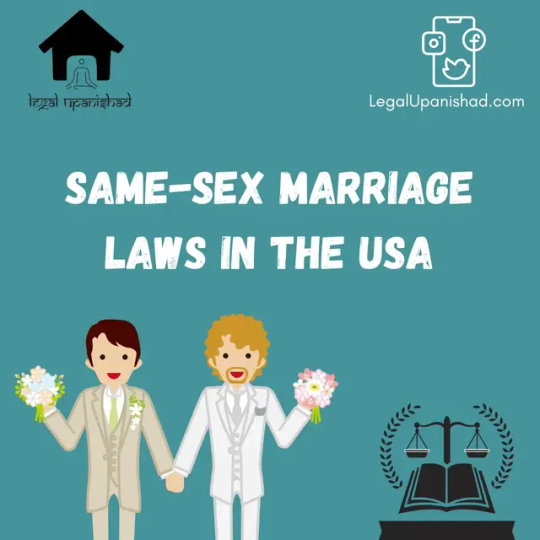
This article on 'Same-Sex Marriage Laws in the USA' was written by Ayush Choudhary, an intern at Legal Upanishad.
Introduction
In the modern era, with the rapidly growing idea of Liberalisation, people have also started respecting the Liberty and freedom of other people. This liberty is also growing in the case of sexual orientations of the people also and in continuance of this the concept of same-sex marriage is also growing. As a consequence, there has been the development of same-sex laws also.
Same-sex marriage laws in the United States have been a topic of intense discussion and debate for several decades. The topic has gained significant attention as people have been fighting for their rights and equality. In recent years, the acceptance of same-sex marriages has grown tremendously, and laws have evolved to reflect the changing attitudes towards them. This article will discuss the history, current status, and future of same-sex marriage laws in the USA.
A brief history of same-sex marriage laws in the USA
The fight for marriage equality for same-sex couples in the USA began in the 1970s, and it was not until 1993 that Hawaii recognized same-sex marriages. However, this decision was later overturned when the Hawaiian Supreme Court ruled in favour of a constitutional amendment banning same-sex marriage. This ruling set the tone for the country, and it became increasingly challenging for same-sex couples to get married.
In 2000, Vermont became the first US state to pass a law allowing civil unions, which provided same-sex couples with some legal rights but did not recognize them as married couples. Other states passed similar laws, such as Connecticut, New Jersey, and California. However, these unions were still seen as a separate status from marriage, which meant that same-sex couples were still not recognized as fully equal to opposite-sex couples.
The biggest move towards same-sex marriage laws occurred in 2003 when the Supreme Court delivered a groundbreaking decision in Lawrence v. Texas. The decision deemed sodomy laws unconstitutional, which had previously criminalized sex between individuals of the same gender. This change was a massive victory for the LGBTQ+ community and signalled that the tide was turning towards progress.
In 2004, same-sex marriage was briefly legal in Massachusetts, but it was not until 2015 that the Supreme Court finally granted marriage equality to same-sex couples in Obergefell v. Hodges. The decision declared that same-sex couples had the constitutional right to marry and that all states must recognize same-sex marriages performed in other states. This ruling brought the LGBTQ+ community's fight for equality and recognition to a significant milestone, and it was celebrated across the country and around the world.
Current status of same-sex marriage laws in the USA:
As of 2021, same-sex marriage is legal in all 50 US states, and same-sex couples receive the same rights, protections and benefits as opposite-sex couples. However, there are still some challenges and obstacles that same-sex couples face, particularly in states where the culture and attitudes towards same-sex marriages are not fully accepted.
Several states have passed laws that allow businesses and individuals to refuse services to same-sex couples based on religious beliefs, a move that has been criticized by LGBTQ+ rights groups. The US Supreme Court has also issued several rulings in recent years that have created some uncertainty about the future status of same-sex marriage laws. For example, in the Masterpiece Cakeshop v. Colorado Civil Rights Commission case, the Supreme Court ruled that a Denver bakery owner could refuse to bake a cake for a same-sex wedding because of his religious beliefs.
In another case, Fulton v. the City of Philadelphia, the Supreme Court found unanimously that the city of Philadelphia violated the First Amendment when it stopped allowing a Catholic social services agency to participate in the city's foster care system because it would not allow same-sex couples to foster children. While the ruling was a victory for religious groups that opposed same-sex marriage, it did not overturn the Obergefell decision, which made same-sex marriages legal across the country.

Same-Sex Marriage Laws in the USA
Future of same-sex marriage laws in the USA:
The fight for LGBTQ+ equality and recognition is an ongoing journey, and it is expected that same-sex marriage laws will continue to evolve in the coming years. Some states may continue to resist same-sex marriages, while others may seek to expand the rights and protections for same-sex couples. One issue that is expected to become more prominent in discussions about same-sex marriage laws is the inclusion of non-binary, intersex, and transgender individuals. While same-sex marriages are legal, there is still confusion and uncertainty about how these laws apply to non-binary individuals. As gender identity and expression become more accepted, it is anticipated that this issue will become a key focus in the ongoing debate about same-sex marriage laws.
Suggestion:
Though in the USA, same-sex marriage has been given recognition in many states, there are still many lacunae and flaws in the present laws. And it is also not clear whether non-binary people are a part of same-sex marriage or not. Therefore, lawmakers need to make laws in a way that can accumulate people of all genders and thus also can remove all uncertainty and confusion about the scope of these laws.
Conclusion:
Same-sex marriage laws have come a long way in the USA over the past several decades. The fight for equality and recognition for same-sex couples has been long and challenging, but it has resulted in significant progress towards achieving equal rights and protections. The legalization of same-sex marriage in all 50 states was a massive victory for the LGBTQ+ community, and it has set the stage for continued progress towards full equality.
While there are still obstacles that need to be overcome, the future of same-sex marriage laws in the USA looks bright. As society continues to evolve and become more accepting of different identities and expressions, there is hope that same-sex marriages will become more widely accepted and recognized across the country. The journey towards full equality is an ongoing one, but every step taken towards progress is a significant victory for the LGBTQ+ community.
References:
- German Lopez, Same-sex marriage in the US, explained, Vox, 29 June 2015, available at: https://www.vox.com/2015/6/26/18093652/same-sex-marriage
- The Journey to Marriage Equality in the United States, Human Rights Campaign, available at: https://www.hrc.org/our-work/stories/the-journey-to-marriage-equality-in-the-united-states
- Overview of Same-Sex Marriage in the United States, Pew Research Center, 7 December 2012, available at: https://www.pewresearch.org/religion/2012/12/07/overview-of-same-sex-marriage-in-the-united-states/
Read the full article
1 note
·
View note
Link
Chief Justice John Roberts, who delivered the opinion of the court, wrote that “as an initial matter, it is plain that the City’s actions have burdened CSS’s religious exercise by putting it to the choice of curtailing its mission or approving relationships inconsistent with its beliefs.”
“The City disagrees,” he continued. “In its view, certification reflects only that foster parents satisfy the statutory criteria, not that the agency endorses their relationships. But CSS believes that certification is tantamount to endorsement. And ‘religious beliefs need not be acceptable, logical, consistent, or comprehensible to others in order to merit First Amendment protection.’”
#SCOTUS#Daily Caller#Catholics#religious freedom#adoption#Mary Margaret Olohan#Catholic Social Services#PA#Philadelphia#First Amendment#Chief Justice John Roberts#foster care#gay marriage#Fulton v. City of Philadelphia
7 notes
·
View notes
Text
Guess Which Justice is Taking the Most Important Cases and Other Details from Last Term
Guess Which Justice is Taking the Most Important Cases and Other Details from Last Term
To start, some of you must be asking how one measures “important cases,” especially when there is no objective measure for this. These measures might also show the difficulty in each case or case complexity, but “most important cases” seem to encompass these other adjectives. Still, measuring the most important cases might seem a subjective matter. This is a valid concern so I don’t use one…

View On WordPress
#AFPF v. Bonta#AMG Capital v. FTC#BP v. Mayor and City Council of Baltimore#Carney v. Adams#Collins v. Yellin#Edwards v. Vannoy#Fulton v. City of Philadelphia#Garland v. Dai#Google v. Oracle#John Roberts#Mahanoy Area School District v. B.L.#Salinas v. US Railroad Retirement Board#Supreme Court Rules#U.S. v. Collins
0 notes
Text
The Satanic Temple is getting worse, not better, on abortion
As the situation becomes more dire, The Satanic Temple's "Religious Reproductive Rights" grift is getting even worse, not better
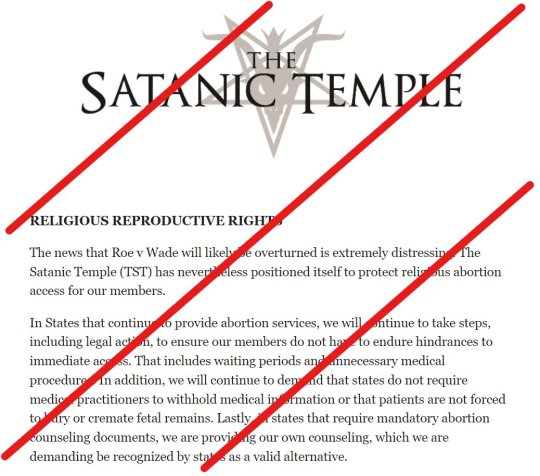
RELIGIOUS REPRODUCTIVE RIGHTS
The news that Roe v Wade will likely be overturned is extremely distressing. The Satanic Temple (TST) has nevertheless positioned itself to protect religious abortion access for our members.
In States that continue to provide abortion services, we will continue to take steps, including legal action, to ensure our members do not have to endure hindrances to immediate access. That includes waiting periods and unnecessary medical procedures. In addition, we will continue to demand that states do not require medical practitioners to withhold medical information or that patients are not forced to bury or cremate fetal remains. Lastly, in states that require mandatory abortion counseling documents, we are providing our own counseling, which we are demanding be recognized by states as a valid alternative.
The Temple has made the news a lot about what it has "announced", "promised", "threatened", etc., but they have delivered on nothing.
Here, notice how often TST's email leans on "demand" without offering any examples of those demands being respected.
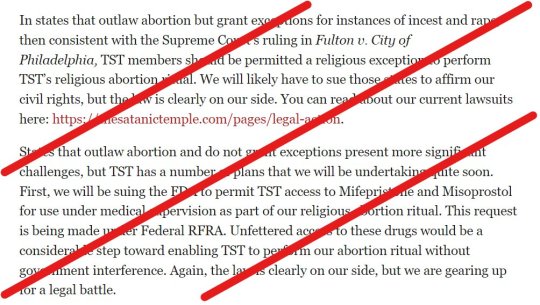
In states that outlaw abortion but grant exceptions for instances of incest and rape, then consistent with the Supreme Court's ruling in Fulton v. City of Philadelphia, TST members should be permitted a religious exception to perform TST’s religious abortion ritual. We will likely have to sue those states to affirm our civil rights, but the law is clearly on our side. You can read about our current lawsuits here: https://thesatanictemple.com/pages/legal-action.
States that outlaw abortion and do not grant exceptions present more significant challenges, but TST has a number of plans that we will be undertaking quite soon. First, we will be suing the FDA to permit TST access to Mifepristone and Misoprostol for use under medical supervision as part of our religious abortion ritual. This request is being made under Federal RFRA. Unfettered access to these drugs would be a considerable step toward enabling TST to perform our abortion ritual without government interference. Again, the law is clearly on our side, but we are gearing up for a legal battle.
The Satanic Temple says the law is "clearly" on their side and they will sue!
But they link you to their own list of court cases and inaccurate summaries.
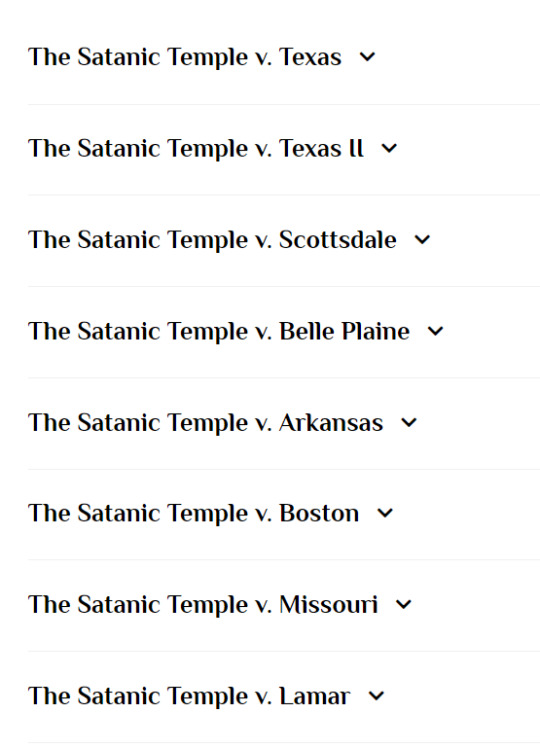
Which means you walk away with negative knowledge because you can't polish these turds accurately and expect to keep support.
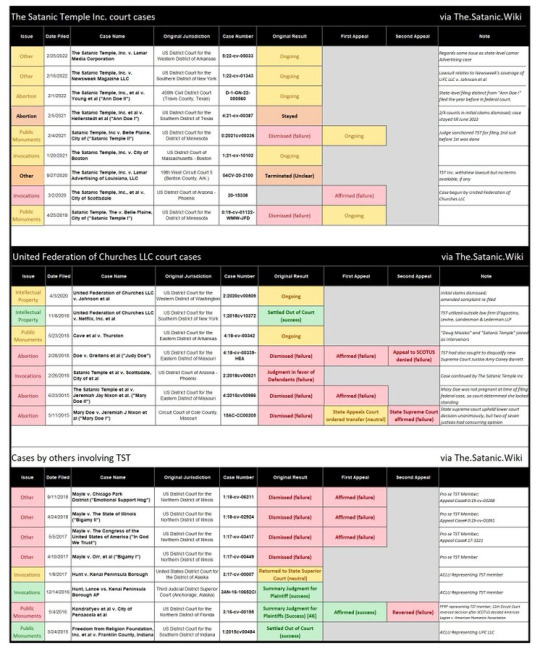
[Lists of lawsuits]
The sentence in this section is the big one, though.
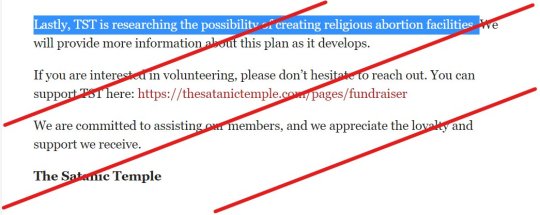
Lastly, TST is researching the possibility of creating religious abortion facilities. [emphasis added] We will provide more information about this plan as it develops.
If you are interested in volunteering, please don’t hesitate to reach out. You can support TST here: <link>
We are committed to assisting our members, and we appreciate the loyalty and support we receive.
The Satanic Temple
"Lastly, TST is researching the possibility of creating religious abortion facilities."
Absolutely unforgivable.
These shameless, irresponsible, grotesque fucks. Venal dipshits — The Satanic Temple.
Is this a thing that is ever remotely going to happen?
No.
No, The Satanic Temple struggles to actually follow thru on keeping volunteers around to offer an after school club for an entire semester.
What in the world can The Satanic Temple point to that they've run competently, other than a money machine that only works because they keep all their financial documents away from state agencies and lie?
Oh, but The Satanic Temple ANNOUNCING they'll create "religious abortion facilities" will get attention.
As this mini-thread points out, the structural failing of journalism is that reporters accurately repeat wild claims because they're exciting and get clicks.
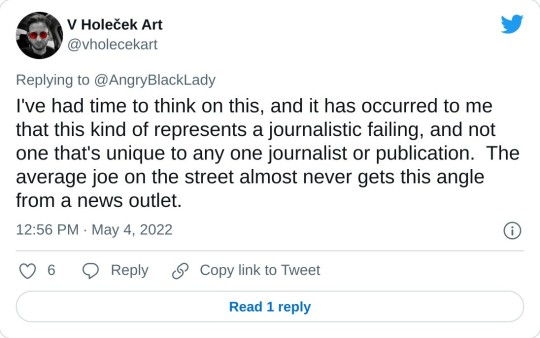
You can bet that Hemant Mehta, Jack Matirko, Black Mass Appeal or other in-house stooges will treat it credibly and not give any of this background of failures
"Not their department."
But real journalists will go along with it as well, sadly.
The Satanic Temple will cynically confirm every rabid QAnon fantasy in the world for another project TST never intends to follow thru on in order to get attention and money, and in the process put real abortion providers at risk.
These fucking ghouls.
The Satanic Temple cannot help you get an abortion, and it does not deserve your support.
#The Satanic Temple#fundraising#abortion#fundraising email#Satanic Temple#Roe v Wade#Satanic abortion#QAnon
125 notes
·
View notes
Photo
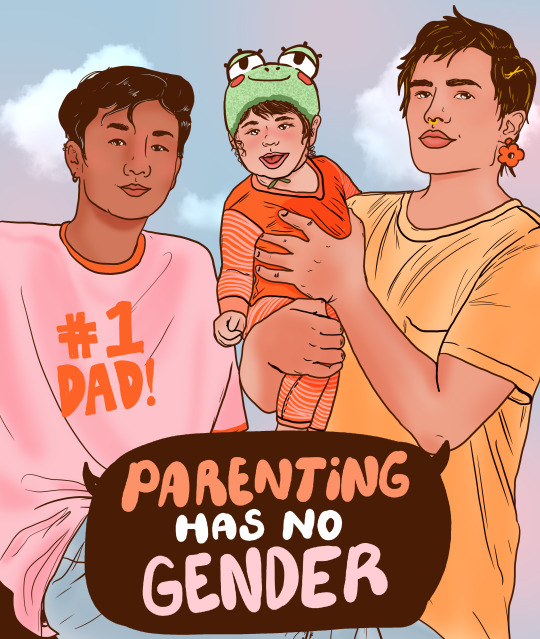
Parenting has no gender. Everyone should be respected in their right to parent regardless of their gender or sexual identity.
Some kids might have just moms, and just dads or just parents!
Today, the Supreme Court is hearing arguments in Fulton v. City of Philadelphia, which will decide whether government-funded foster care agencies have a “right” to discriminate against LGBTQ+ people applying to become foster parents. The ruling could have broader implications, and allow private agencies that receive taxpayer-funding to provide government services — such as foster care providers, food banks, homeless shelters, and more — to deny services to people who are LGBTQ, Jewish, Muslim, or Mormon.
Art by Liberal Jane
[Illustration of two masculine people holding a baby dressed in a frog costume. The person on the left is wearing a pink shirt that says #1 Dad and blue jeans. The person on the right has a yellow shirt, and is accessorized with a nose piercing and orange flower earring. The background is blue with clouds and there's a speech bubble that reads, 'parenting has no gender']
599 notes
·
View notes
Link
While there has been much celebration regarding the Supreme Court’s recent ruling in Bostock v. Clayton County protecting employees against discrimination because of their sexual orientation or gender identity, there is another important case coming up soon.
On November 4, the Supreme Court will hear a case that could allow private agencies that receive taxpayer-funding to provide government services — such as foster care providers, food banks, homeless shelters, and more — to deny services to people who are LGBTQ+, Jewish, Muslim, or Mormon.
Yes, I realize Election Day is the day before. However, this case has the potential to further chip away at protections for LGBTQ+ people (and other marginalized groups) and should not be ignored!
#the linked article is v quick to read and can help shed some light on the case if you're interested in reading up on it!#LGBT rights#SCOTUS#Supreme Court#politics
24 notes
·
View notes
Text
Very excited for the day after the election when the country may well have descended into widespread chaos amid disputes being flung in every direction.
Meanwhile, the new Supreme Court will be reviewing a case (Fulton v. City of Philadelphia) that could decide whether or not religious agencies can essentially ignore anti-discrimination laws.

11 notes
·
View notes
Link
As stated in recent U.S. Supreme Court documents: "Barronelle Stutzman is a Christian artist who imagines, designs and creates floral art. ... She cannot take part in or create custom art that celebrates sacred ceremonies that violate her faith."
This legal drama appears to have ended with Stutzman's second trip to the high court, and its July 2 refusal to review a Washington Supreme Court decision that drew a red line between a citizen's right to hold religious beliefs and the right to freely exercise these beliefs in public life. Supreme Court justices Clarence Thomas, Samuel Alito and Neil Gorsuch backed a review, but lacked a fourth vote.
"This was shocking" to religious conservatives "because Barronelle seemed to have so many favorable facts on her side," said Andrew Walker, who teaches ethics at Southern Baptist Theological Seminary.
Stutzman is a 76-year-old grandmother and great-grandmother who faces the loss of her small business and her retirement savings. She has employed gay staff members. She helped Ingersoll find another designer for his wedding flowers. In the progressive Northwest, her Southern Baptist faith clearly makes her part of a religious minority.
"Barronelle is a heretic because she has clashed with today's version of progressivism," Walker said. Many cultures have "blasphemy laws" and Stutzman has "been found guilty ... Her beliefs, and her insistence that she should live according to those beliefs, clash with the beliefs of the current zeitgeist."
Part of the confusion is that this court's refusal to hear Stutzman's case appears to clash with its recent 9-0 Fulton v. City of Philadelphia decision. It protected the right of Catholic Social Services leaders to follow church teachings and, thus, to refuse to refer children to same-sex couples for adoption or foster care.
Responding to that decision, Roger Severino of the Ethics & Public Policy Center in Washington wrote: "By its actions, the Court is saying people with sincere faith-informed understandings of social issues that cut against the grain of secularist thought aren't to be treated as bigots."
That was then. The subsequent decision to "punt" on the Stutzman case, said Walker, was another example of this Supreme Court delaying a clear decision on First Amendment concerns caused by clashes between ancient faiths and the Sexual Revolution.
These concerns will continue to haunt the court, in part because of church-state precedents such as this famous language from the 1943 West Virginia v. Barnette decision, which said the government could not force Jehovah's Witnesses to recite the Pledge of Allegiance.
"If there is any fixed star in our constitutional constellation," wrote Justice Robert Jackson, "it is that no official, high or petty, can prescribe what shall be orthodox in politics, nationalism, religion or other matters of opinion, or force citizens to confess by word or act their faith therein."
#SCOTUS#First Amendment#Robert Ingersoll#Barronelle Stutzman#gay marriage#Christians#religious freedom#Arkansas Democrat Gazette#Terry Mattingly#Fulton v. City of Philadelphia#Roger Severino#West Virginia v. Barnette#Andrew Walker#Baptists#secularism
1 note
·
View note
Text
Fulton v. City of Philadelphia decision....ugh
#u surprising as was the nestlé ruling but ugh#not looking forward to whatever way they find to relitigate obergefell#*unsurprising
1 note
·
View note
Text
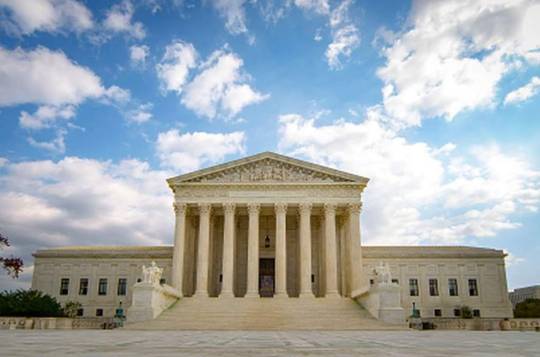
From the ACLU:
"Here are the critical cases SCOTUS is weighing in on:
Safeguarding the census
Status: Court date set for November 30
Why it matters: In Trump v. State of New York, the Court will hear the Trump administration's appeal of a lower court ruling that blocked his attempt to exclude undocumented immigrants from being counted in the census for the purpose of apportioning seats in the U.S. House of Representatives and votes in the Electoral College. The legal mandate is clear – every single person is included in the census, and every single person is represented in Congress. Undocumented immigrants are people – and nothing President Trump does or says changes that fact. The ACLU filed a lawsuit on behalf of immigrants' rights groups challenging Trump's order.
Defending LGBTQ rights and more
Status: Awaiting Supreme Court ruling
Why it matters: Just one day after the election, the Supreme Court heard a case that could undermine civil rights laws and LGBTQ families for generations to come in Fulton v. The City of Philadelphia. The ACLU and our affiliate argued in support of Philadelphia, which is being sued by Catholic Social Services (CSS) – a taxpayer-funded foster care agency that will not accept same-sex couples. A ruling for CSS could impact the more than 400,000 children in our nation's foster care system and allow other taxpayer-funded agencies to discriminate as well.
Protecting the Affordable Care Act
Status: Awaiting Supreme Court ruling
Why it matters: The Affordable Care Act, which made health insurance accessible to millions for the first time, could be in jeopardy in California v. Texas. Any decision from the justices striking down the law would have devastating ramifications for the civil liberties advancements that the ACA has provided – that's why the ACLU filed a friend-of-the-court brief, along with many disability rights groups, in its defense. Dismantling the ACA would exacerbate the systemic disparities in access to health care that Black, Latinx, and disabled people face in this country, which are now approaching epic proportions during the pandemic.
Pushing for police accountability
Status: Awaiting Supreme Court ruling
Why it matters: The question before the Court in Torres v. Madrid is whether police are unbound by the Constitution when it comes to the use of force against people who resist or flee from them. If the justices rule in favor, it could create a loophole that would entirely remove certain excessive force cases from scrutiny under the Fourth Amendment. The ACLU and a diverse coalition of partners filed a friend-of-the-court brief arguing the dangers of such a decision – especially given the nationwide epidemic of police violence.
Challenging the "Return to Mexico" policy
Status: Review granted; Supreme Court date still undetermined
Why it matters: The Court agreed to review a Ninth Circuit decision in Innovation Law Lab v. Wolf that held illegal a Trump administration policy forcibly returning individuals and families seeking asylum to Mexico. In Mexico, those seeking asylum are often stuck in refugee camps, vulnerable to kidnapping, extortion, assault, and other abuse, indefinitely. The ACLU and partners are challenging the policy, officially called the Migrant Protection Protocols (MPP), which was blocked by a federal court in California last year but remained in effect due to court-ordered stays as the case is litigated. Asylum seekers face horrendous conditions as their claims for protection in the United States are considered and remain in grave danger every day this policy is in effect."
6 notes
·
View notes
Note
I know they’re still counting votes but you should also pay attention to Fulton v Philadelphia. It’s going against SCOTUS today and is mainly about whether LGBT Couples can be discriminated by foster agencies. If SCOTUS rules with the city, it’s likely to bring up more cases that would strike down Obgerfell 🙃

#answered#I know this is bad to do but I simply do not have the mental capacity to worry about this rn
2 notes
·
View notes
Text
UR RIGHTS THAT WERE ROLLED BACK BY TRUMP IN 2020
Info from: https://civilrights.org/trump-rollbacks/
On January 3, the Trump administration filed a brief in June Medical Services v. Gee, urging the Court to allow a Louisiana abortion access law to go into effect. The civil rights community filed briefs urging the Court to strike down the restrictive law, highlighting the law’s impact on Black women.
On January 7, the Department of Housing and Urban Development issued a proposal that would gut the agency’s 2015 Affirmatively Furthering Fair Housing rule. HUD’s proposal would leave people of color, women, and other protected communities already harmed by unfair and unequal housing policies at a further disadvantage.
On January 13, The Washington Post reported that the Trump administration would divert $7.2 billion of funding from the Pentagon to fund the president’s harmful and wasteful wall along the southern border.
On January 23, the Department of State announced a new regulation aimed at denying pregnant people visas to prevent them from traveling to the United States. The regulation represents an attack against pregnant people living in countries without access to the Visa Waiver Program and immigrant women, particularly those of color, and with low incomes.
On January 30, the Centers for Medicare and Medicaid Services released block grant guidance to allow states to cap Medicaid spending – essentially putting forward the notion that we should ration health care for the most vulnerable people in our nation.
On January 31, the Trump administration announced an expansion of its Muslim ban, which will expand restrictions on additional countries including Myanmar (also known as Burma), Eritrea, Kyrgyzstan, Nigeria, Sudan, and Tanzania.
On February 10, the Trump administration released its Fiscal Year 2021 budget proposal, which included $1 trillion in cuts to Medicaid and the ACA over 10 years, cuts to SNAP by $182 billion over 10 years, cuts assistance for some people with disabilities through Social Security Disability Insurance and Supplemental Security Income, and reduces the Temporary Assistance for Needy Families (TANF) program by $21 billion over 10 years, among other drastic cuts.
On February 13, the Department of Housing and Urban Development proposed to amend the Equal Participation of Faith-Based Organizations rule that removes safeguards to prevent discrimination.
On February 14, the Trump administration announced the deployment of law enforcement tactical units from the southern border as part of an arrest operation in sanctuary cities across the country. This includes the deployment of members of the elite tactical unit known as BORTAC, which acts as a Border Patrol SWAT team.
On February 20, the White House published a memo (dated January 29) signed by Trump that granted Secretary of Defense Mark Esper the authority to ignore the collective bargaining rights of civilian employees working for the Department of Defense.
On February 26, the Department of Homeland Security expanded two pilot programs, the Humanitarian Asylum Review Process (HARP) for Mexican nationals and Prompt Asylum Claim Review (PACR), that fast-track the asylum process for migrants at the U.S. border. The American Civil Liberties Union argues that both programs deny asylum seekers due process since it is nearly impossible for the migrants to access legal help.
On February 26, the Department of Justice sided with the plaintiff, Students for Fair Admissions, to oppose race-based affirmative action.
On February 26, the Department of Justice created a Denaturalization Section in its immigration office to prioritize stripping citizenship rights from naturalized immigrants who commit certain crimes.
On February 27, the Department of Justice filed a statement of interest in support of a Kentucky wedding photographer who is challenging a city ordinance banning businesses from discriminating against gay customers. The photographer, Chelsey Nelson, refused to photograph same-sex weddings due to her religious beliefs.
On February 28, the Department of Justice proposed regulations increasing fees for immigrants and requiring asylum seekers to pay a $50 fee to have their cases heard in court. Fees for permanent residence permits would increase by $990, to a total of $2,750, and the cost for naturalization of new citizens would increase by $445, to $1,170.
On March 6, the Department of Justice issued a rule saying that DNA data samples from migrants taken into federal custody after trying to cross the U.S. border can be stored and shared among federal agencies.
On March 17, the Department of Labor’s Office of Federal Contract Compliance Programs temporarily suspended some contractors’ affirmative action requirements under the three statutes it oversees.
On March 20, the Centers for Disease Control and Prevention imposed a 30-day restriction on all nonessential travel into the United States from Mexico and Canada – an effort, led by Stephen Miller, to use public health laws to reduce immigration.
On March 24, Attorney General William Barr signed a statement of interest arguing against the Connecticut Interscholastic Athletic Conference’s transgender athlete policy, which allows athletes to compete as the gender with which they identify.
On April 20, the Trump administration extended its March 2020 CDC rule on border restrictions until May 20, 2020.
On April 21, Trump signed an executive order to temporarily ban the issuance of green cards to people seeking permanent residency in the United States – a move that was viewed as a shameless manipulation of the pandemic to justify the administration’s xenophobic policies.
On April 30, the Department of Education issued guidance, flouting congressional intent under the CARES Act, that directs school districts to share millions of dollars designated for low-income students with wealthy private schools.
On May 6, the Department of Education released its final rule on Title IX that raises the bar of proof for sexual misconduct, bolsters the rights of those accused, and introduces new protections that include sexual harassment. If the rule takes effect, it will silence sexual assault survivors and limit their educational opportunity.
On May 12, the Department of Agriculture appealed an injunction that blocked the agency from proceeding with cuts to the SNAP program (food stamps). The new requirements, if the USDA wins its appeals, would strip 688,000 Americans of their food benefits.
On May 19, the Trump administration announced the indefinite extension of its CDC order that allows federal authorities at the border to immediately return migrants to their home countries.
On May 29, Trump vetoed a bipartisan resolution to overturn a Department of Education rule and hold Secretary DeVos accountable for failing to provide relief to students defrauded by for-profit colleges.
On June 1, police officers and the National Guard dispersed peaceful protesters outside the White House using teargas and flash-bang explosions so that Trump could pose for photos, while holding up a Bible, in front of St. John’s Episcopal Church.
On June 3, the Department of Justice filed a brief in Fulton v. City of Philadelphia calling on the U.S. Supreme Court to allow religious-affiliated adoption agencies to refuse child placement into LGBTQ homes. The Justice Department is not a party to the case.
On June 12, the Department of Health and Human Services issued its final rule rolling back the non-discrimination protections (Section 1557) of the Affordable Care Act. The rule will promote discrimination in medical care.
On June 14, The Washington Post reported that the Department of Housing and Urban Development will propose a rule that would roll back Obama-era guidance requiring single-sex homeless shelters to accept transgender people.
On June 15, a 161-page regulation from the Departments of Homeland Security and Justice was published in the Federal Register that would make it exceedingly difficult for migrants to claim asylum in the United States.
#2020#human rights#civil rights#educate#fuck the government#fuck trump#government#usa#black rights are human rights#lgbtq#marsha p johnson#minneapolis#fbi#twitter#nojusticenopeace#protest#educate yourself#fuck the police#blm#blacklivesmatter#defund the fucking police#justice#antifa#antifacist#kpop#trump#politics#us politics#supreme court#amerikkka
1 note
·
View note
Link
This In a recent lecture in Rel 390, we studied and watched a film on Madalyn Murray O’Hair. Once known as the most hated woman on Earth. She challenged the status quo on religion and state. She portrayed that religion and state should be totally separated. Politics and Religion should not be intertwined. O’Hair was once seen as the most prominent figure for the atheism society. Atheism is denying the notion of Gods. She cited rational and scientific information to support her claims.
O’Hair pushed to a broad audience to get her point across. Her claims were highly controversial and angered the religious and christian community in particular. As O’Hair’s message spread across the nation, she was seen as a enemy by the general public. This ultimately gave the atheist an immoral connotation to the general public in political manner.
Some Theists agreed with some points she pushed across the public, but not others. She rejected the people and because of this had a small amount of allies across the political and broad community.
Despite these setbacks, O’Hair’s atheism ideals had long-lasting impacts on the political environment in America. For example, she filed numerous lawsuits that dealt with the First Amendment and the separation of church and state.
O’Hare sought to prohibit schools from requiring students to participate in religious exercises in the classroom. Obviously, this was not the last time the Supreme Court would question religion against the First Amendment.
On February 24, 2020 the supreme court had another case on its hands involving religion and LGBT rights. “Supreme Court Agrees to Hear Case of Religion vs. Gay Rights Over Foster Care,” a Los Angeles Times article by Staff Writer David G. Savage. The case will contain Philadelphia’s exit of contract with Catholic Social Services. This happens because of the agency’s refusal for same sex couples to foster children.
This case had to do with discrimination towards those with religious beliefs that same-sex marriage is okay. It violated their religious beliefs about same sex marriage. The city discontinued its agreement with the CSS and stripped the organization of its authority to place foster children. In contention, The CSS appealed to the Supreme Court, contending that its exclusion from the city’s adoption program was a violation of their First Amendment. The right to freely exercise religion. Ultimately, Fulton v Philadelphia will decide whether it is constitutional for taxpayer-funded foster care agencies to discriminate against sexual orientation.
Reading this article was interesting to me being a religious person. I do not want to see people discriminated against because of their sexual orientation, but I also want to follow my religion. The Supreme’s court decisions in these types of cases call for transformation in the political environment we live in. The distinction between state and church are still being debated and ruled on everyday.
1 note
·
View note
Link
In a recent lecture, the class covered the life of Madalyn Murray O’Hair, once popularly known throughout the United States as “the most hated woman in America.” Before she was kidnapped in 1995, O’Hair was arguably the most prominent, polarizing advocate for atheism and the separation of church and state. As an atheist, she denied the existence of God and gods, citing rationality and scientific evidence, and sought to convince as many people as she could to let go of their religion and superstitions.
Speaking and writing in a colloquial manner, O’Hair communicated her message to a broad audience with significant success, consequently angering hundreds of thousands of Christian Americans. While she was able to introduce atheism into mainstream discussion, O’Hair’s politically incorrect nature reinforced the common notion that atheism and atheists in general were religiously immoral.
Furthermore, she shunned and rejected theists who sympathized or agreed with some of the things she said, giving no quarter in her ideological campaign against religion. She had few allies as a result. Despite these setbacks, O’Hair’s advocacy had serious, long-lasting impacts on American politics. For example, she filed several lawsuits that dealt with the First Amendment and the separation of church and state. In 1960, O’Hair was a plaintiff in Murray v. Curlett, a case which was consolidated with Abington School District v. Schempp and sought to prohibit schools from requiring students to participate in religious exercises in the classroom. In 1963, the Supreme Court concluded that these exercises were unconstitutional, and public schools could not sponsor Bible readings and prayer recitations under the Establishment Clause. Obviously, this was not the last time the Supreme Court would pit religion against the First Amendment.
Last Monday on the 24th of February, the Supreme Court announced that it would decide yet another battle between religion and LGBT rights. According to “Supreme Court Agrees to Hear Case of Religion vs. Gay Rights Over Foster Care,” a Los Angeles Times article by Staff Writer David G. Savage, the new case will involve the city of Philadelphia’s termination of a contract with Catholic Social Services (CSS) because of the agency’s refusal to place foster children in the care of same-sex couples.
It all began when church officials rebuffed the city’s request for Catholic adoption agencies to produce a written commitment to work with same-sex couples, arguing that it would violate their religious beliefs about marriage. Citing its ban on sexual orientation-based discrimination, the city promptly ended its contract with CSS and stripped the organization of its authority to place foster children. In protest, CSS appealed to the Supreme Court, contending that its exclusion from the city’s adoption program was a violation of their First Amendment right to freely exercise their religion. Ultimately, Fulton v Philadelphia will decide whether it is constitutional for taxpayer-funded foster care agencies to discriminate against sexual orientation.
Being an atheist, I am keenly aware that the Supreme Court’s decision for this case may result in a drastic transformation of laws that govern the separation between church and state. In the past, the Supreme Court has generally ruled that one’s religious beliefs could not grant them special exemption from the law. If the Court rules in CSS’s favor, then religious organizations in the US may be able to discriminate based on their religious beliefs under the protection of the federal government.
#religion#church#state#supreme court#justice#discrimination#gay rights#lgbt#atheism#christianity#god
1 note
·
View note